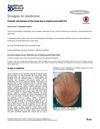TLDR Topical cetirizine 1% increases hair density and may be a promising treatment for hair loss.
A preliminary study conducted by Rossi et al. (2017) investigated the therapeutic efficacy of topical cetirizine 1% lotion applied once a day on the scalp, in the management of androgenetic alopecia (AGA). The authors recruited 85 patients (male and female patients), of which 67 were used topical cetirizine, while 18 were control patients. The main effect of cetirizine was an increase in total hair density, terminal hair density, and diameter variation. Topical cetirizine may be a promising therapy for AGA with an excellent safety profile. Further studies are warranted to assess the insight action of the drug, the possible role of other H1-blockers and whether it is effective in other forms of alopecias.
 11 citations
,
July 2017 in “Expert Opinion on Investigational Drugs”
11 citations
,
July 2017 in “Expert Opinion on Investigational Drugs” New hair loss treatments may include topical medications, injections, and improved transplant methods.
 21 citations
,
June 2017 in “Journal of Dermatological Treatment”
21 citations
,
June 2017 in “Journal of Dermatological Treatment” Topical cetirizine improves hair density and thickness in androgenetic alopecia, but more research is needed.
 205 citations
,
March 2012 in “Science Translational Medicine”
205 citations
,
March 2012 in “Science Translational Medicine” PGD2 stops hair growth and is higher in bald men with AGA.
 68 citations
,
April 2002 in “Journal of Alternative and Complementary Medicine”
68 citations
,
April 2002 in “Journal of Alternative and Complementary Medicine” Natural 5AR inhibitors effectively improve mild to moderate hair loss in men.
7 citations
,
April 2021 in “Journal of Pharmacy and Pharmaceutical Sciences” Cetirizine 1% helps hair growth in men with no major side effects, but minoxidil 5% works better.
March 2020 in “Case medical research”  3 citations
,
January 2018
3 citations
,
January 2018 A woman had an unusual allergic reaction to a hair loss treatment, which cleared up after stopping the treatment and using a different medication.
April 1985 in “Plastic & Reconstructive Surgery” Topical minoxidil can help regrow hair in alopecia areata but is less effective for severe cases.
 16 citations
,
April 1984 in “Archives of Dermatology”
16 citations
,
April 1984 in “Archives of Dermatology” Topical minoxidil can help hair regrowth in alopecia areata patients, but maintaining the growth after stopping treatment is inconsistent.






